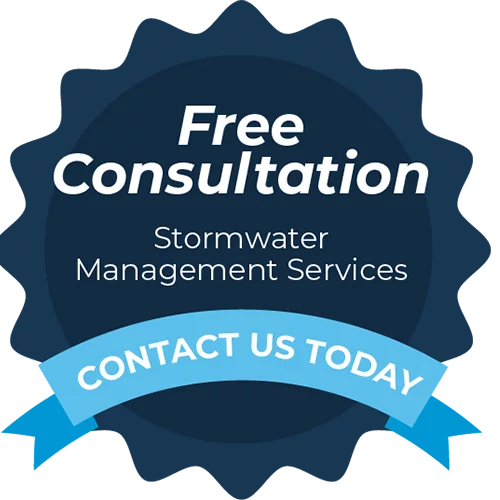5 Benefits of Low-Impact Development Explained
If you are developing a commercial property and are considering stormwater solutions to control runoff, you may wonder what low-impact development is. In short, it is a system that mimics the natural hydrology of the property to manage rainfall at the source rather than allowing runoff to affect other properties in the area. It is an effective strategy to minimize runoff and erosion while preventing pollution from impermeable surfaces like parking lots and roadways. There are five basic principles of low-impact development.
Conserve Natural Areas
Paving over the entirety of a commercial property will create one massive surface to catch rain and create undesirable runoff. To keep runoff to a minimum, maintain as many green areas as possible. Established native plants and soil can go a long way toward controlling rainwater and minimizing runoff. Plus, you will reduce the harmful effects of runoff and make your commercial property look more attractive and natural.
Minimize Impact on Hydrology
Using appropriate techniques to minimize the development’s effects on the natural hydrology of the property can significantly reduce runoff and its damaging effects like pollution. This can mean everything from maintaining natural areas to avoiding significant changes to the grade and using permeable surfaces whenever possible rather than asphalt or concrete — mimicking the natural hydrology as closely as possible will allow rain to soak into the soil or evaporate.
Maintain Runoff Rate & Duration
Ideally, rainwater should never leave the property. Runoff rates and duration after the development is complete should match those of the undeveloped property. A combination of retention and control features should allow you to minimize the water that leaves the property as runoff. This will reduce your impact on neighboring properties and the municipal stormwater system.
Implement Integrated Management Practices
Integrated Management Practices are your property’s built-in features that help you manage runoff. They include systems that infiltrate rainwater into the soil, retain runoff, store it, or aid in its evaporation. Some IMPS examples include swales or small ridges that direct rainwater to certain areas, rain gardens that keep runoff with plants and soil, green roofs that absorb rainwater, or pervious concrete that allows moisture to soak through into the earth below. All of these reduce the amount of rainwater that turns into runoff.
Pollution Prevention, Maintenance, & Public Education
Runoff from solid surfaces like parking lots or sidewalks can often contain trash, debris, and pollutants like fuel or oil. Capturing and treating runoff from these areas is essential to protect the environment. Systems like hydrodynamic separators can pull large debris and sediment from the runoff. At the same time, retention, filtering, and treatment facilities can filter the water and remove pollutants like oil, heavy metals, or chemicals. Routine maintenance is essential to keep these systems operating correctly, as is public education to help prevent pollution and keep debris out of the stormwater system. Preventing pollution can keep help to protect groundwater resources, as well as natural habitats for animals, birds, and fish.
Why Choose iSTORMWATER for Low-Impact Development Projects?
iSTORMWATER has over 20 years of industry experience installing and maintaining stormwater management systems, and we have worked closely with commercial developments throughout Maryland, Virginia, and the Washington, DC, area to minimize their impact on the environment. We have the skill and knowledge to manage runoff effectively and prevent pollution, and we can design real-world stormwater solutions that are an excellent fit for your commercial property. We feature an experienced team, upfront pricing, detailed estimates, and quality work backed by our iSTORMWATER guarantee. Plus, we are available 24/7 for emergency stormwater services anywhere in the DC metro area. Check out our FAQ to learn more!
Do you need help with runoff, stormwater management, or erosion control? Call iSTORMWATER today at (410) 231-3455 or contact us online to schedule a stormwater management consultation in the DMV area.
Real Results
iStormwater LLC was an excellent choice. They made the process of the Stormwater pond repairs seamless. They took charge of the project and got the project approved and passing the inspection. We highly recommend them and would use them again.
Incredible stormwater management service. The owner John consulted on a property I manage and ended up saving us thousands of dollars in environmental fees from the government. Now, our property is compliant with the EPA and we have a great partner to keep us maintained on stormwater regulations over time.
So helpful with all of my water issues.
Great communication and leadership and a family friendly atmosphere. Thank you John!
Stormwater regulations across the Mid-Atlantic continue to tighten - and for good reason. As development increases and rainfall patterns shift, effective stormwater management is essential...
- Annapolis
- Anne Arundel County
- Baltimore County
- Baltimore
- Bel Air South
- Bethesda
- Bowie
- Cecil County
- Charles County
- Columbia
- Gaithersburg
- Glen Burnie
- Howard County
- Montgomery County
- Pasadena
- Prince George’s County
- Rockville
- Severna Park
- St. Mary’s County



